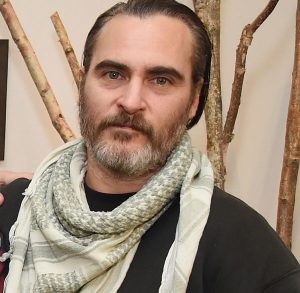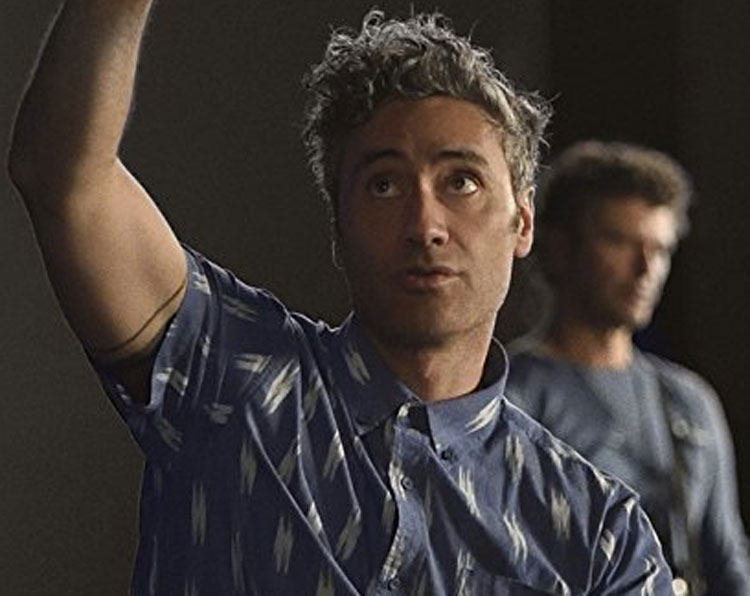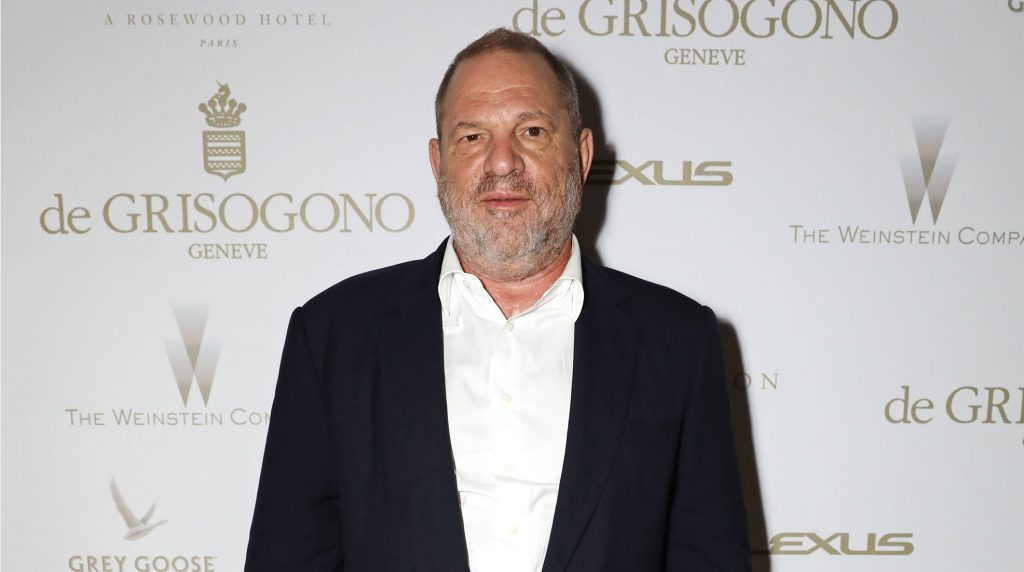December 8, 2021
by Carla Hay

Directed by Adam McKay
Culture Representation: Taking place in the United States (mostly in Michigan, Illinois and Washington, D.C.) during the six months before an apocalypse, the dark comedy film “Don’t Look Up” features a predominantly white cast of characters (with some African Americans and Asians) representing the working-class, middle-class and wealthy.
Culture Clash: After a Ph.D. student in astronomy discovers that a catastrophic comet is headed to Earth to destroy the planet in six months, people have varying reactions, including a stubborn refusal to believe that the apocalypse is coming.
Culture Audience: “Don’t Look Up” will appeal primarily to fans of the movie’s star-studded cast and apocalyptic comedies that repeat the same types of gags for an overly long runtime of nearly two-and-a-half hours.

The dark comedy “Don’t Look Up” is the equivalent of watching an annoyingly smug hack comedian tell the same clumsily executed joke for more than two hours. This movie crams in a lot of big-name stars to try to make it look better than it really is. In trying to make a point about complacency and denial about how climate change is a global crisis, writer/director/producer Adam McKay instead mishandles that point in “Don’t Look Up,” by not only overselling it with stunt casting but also selling it short with a bloated and messy story.
In a statement in the production notes for “Don’t Look Up,” McKay says that he was inspired to do the movie after reading David Wallace-Wells’ 2019 non-fiction book “The Uninhabitable Earth.” In the statement, McKay comments on the book: “I couldn’t get it out of my head. It depicts the ways in which global warming will wreak havoc on the planet if nothing is done to combat the climate crisis.”
McKay continues, “And, it all boiled down to this idea I just couldn’t shake: We all know how to react when there is a killer with an ax, or when your house is on fire, but what the author David Wallace-Wells was writing about was a million times worse. How do we get people to realize this is a clear and present danger? How close does that danger have to be for us to have the proper response? I felt like I needed to write this script.”
Based on the disappointing end results of “Don’t Look Up,” McKay should’ve spent more time honing the script, which lazily repeats the same gimmick about climate-change deniers being blithering idiots, and hammers this stereotype all over the movie like a robotic jackhammer on full-blast. Almost all of the people in the movie are caricatures who aren’t very funny at all. In a movie about an impending apocalypse, most of the main characters are not seen with any family members or even shown talking about family members. That’s how phony “Don’t Look Up” is and how it makes these caricatures just hollow vessels for the movie’s dumb jokes.
McKay and the other “Don’t Look Up” filmmakers seem to have spent more energy corralling numerous celebrity cast members (many of whom are Oscar winners and Oscar nominees) to overstuff the movie, rather than giving these cast members well-rounded characters to play. All of the characters are extremely shallow and one-note. And for a movie that has an all-star cast and is set primarily in the United States, it’s appallingly exclusionary and racist that the “Don’t Look Up” filmmakers couldn’t be bothered to cast any Hispanic/Latino people to be among the stars of the movie. When people talk about how Hispanic/Latino people are underrepresented in American-made movies, “Don’t Look Up” is part of that problem.
“Don’t Look Up” is the type of movie that takes nearly two-and-a-half hours (138 minutes, to be exact) to tell a story that could’ve been told in 90 minutes or less. And even if the movie had been about 90 minutes, it still would be stretched too thin by the flimsy plot. If you want to watch an apocalypse movie where people deny that an apocalypse is going to happen, and other people get angry at these deniers, while everyone mugs for the camera and tells really pathetic and poorly written jokes, then “Don’t Look Up” is the movie for you.
In “Don’t Look Up,” Jennifer Lawrence portrays Kate Dibiasky, a Ph.D. student in astronomy at Michigan State University. Kate works in an unrealistic-looking high-tech science lab that looks like a movie set, not a lab that’s supposed to be on a university campus. Kate is a character that looks like what an uptight person thinks is “edgy,” because Kate’s hair is dyed bright red, she wears a nose ring, and she likes to smoke marijuana. One day, a bored-looking Kate sees on her computer monitor that an unusual comet is in the universe. She perks up when she finds out that this comet is extremely rare.
She alerts her professor/supervisor Dr. Randall Mindy (played by Leonardo DiCaprio), who is so elated by this comet discovery, he throws an impromptu party with other students in the lab. But that elation soon turns to horror, when Randall calculates during the party that this comet is actually headed toward Earth. He’s so freaked out by these results that he doesn’t tell his students right away and quickly orders them to leave the building. However, he tells Kate to stay behind and confides his suspicions to her. Kate does her own calculations and finds out that the comet will destroy Earth in six months and 14 days.
Kate and Randall call high-level people at NASA, including NASA chief Dr. Jocelyn Calder (played by Hettienne Park), who is skeptical and doesn’t want to deal with investigating this claim about a comet that will destroy Earth. She passes Kate and Randall off to her underling Dr. Teddy Oglethorpe (played by Rob Morgan), who is NASA’s head of planetary defense. Dr. Oglethorpe essentially becomes an awkward sidekick to Kate and Randall for much of the movie.
The next thing you know, Kate and Randall are whisked on a military plane to the White House, where they meet President Janie Orlean (played by Meryl Streep), who is obviously supposed to be a female version of Donald Trump. (Even if people didn’t know that McKay is an outspoken liberal, his political bias is obvious in his movies.) President Orlean is currently distracted because she’s in the middle of a scandal: Her nomination choice to be a U.S Supreme Court Justice is trigger-happy, right-wing Sheriff Conlon (played by Erik Parillo), whose past as a nude model has been exposed.
The scandal gets worse, when it’s revealed in the news that Sheriff Conlon and President Orlean (who is a bachelorette) have been secret lovers, and she sent him photos of her vagina. This is not spoiler information because—much like all the other crude scenarios in “Don’t Look Up”—it has no bearing on the plot. This movie is filled with a bunch of conversations that do nothing to enhance the story but are just in the movie to try to make everything in the film look like it’s “cutting-edge,” when it’s not. “Don’t Look Up” is really just a dumpster of tawdry and witless jokes thrown together in a monotonous cesspool.
Even though Sherrif Conlon is President Orlean’s choice to be a U.S. Supreme Court Justice, he doesn’t have a law degree. Choosing unqualified people for high-ranking government jobs seems to be President Orlean’s speciality. She has appointed her unqualfied and very obnoxious son Jason Orlean (played by Jonah Hill) as the White House’s chief of staff. (Jason’s father is not seen or mentioned in the movie.)
Jason likes to go on egotistical rants and occasionally spews garbage lines that allude to him having incestuous feelings for his mother. Here’s an example of the not-very-funny dialogue in the movie. At one point, Jason smirks about his mother when he says, “I can’t think of another president I’d rather see in Playboy.” He makes other creepy comments to make it clear that he’s sexually attracted to his mother.
Randall estimates that the comet’s destruction of Earth will be like “a billion Hiroshima bombs.” Kate and Randall desperately try to warn anyone who will listen about this impending apocalypse. The movie wastes a lot of time with repeated scenarios of Randall and Kate seeming to be the only people in America who are really sounding the alarm about this apocalypse and sometimes having emotional meltdowns because people won’t take the warnings seriously.
The over-used “joke” in the movie is that most people whom Kate and Randall tell about the apolcalypse either don’t believe them, or if they do believe, they shame Randall and Kate for being too depressing and paranoid. Meanwhile, other people try to use the apocalypse for their own selfish reasons, which usually have to do with wanting more money and power. A military plan to destroy the comet goes awry when certain greedy people discover there are vaulable minerals inside the comet that could make certain people a massive fortune.
The movie’s title comes from a catch phrase used by “apocalypse deniers,” who say, “Don’t Look Up” as their mantra, which they chant whenever and wherever they fell like chanting it. Many of these “apocalypse deniers” gather at rallies that the “Don’t Look Up” filmmakers deliberately made to look a lot like rallies for Donald Trump supporters, including many attendees wearing red baseball caps. In the movie, the “Don’t Look Up” slogan is used by people to identify themselves as not only apocalypse deniers but also advocates of other conservative-leaning political beliefs.
As an example of how poorly written “Don’t Look Up” is, several characters in the movie are useless and just take up space to further stretch out the running time in the movie. In the beginning of “Don’t Look Up,” Kate has a journalist boyfriend named Phillip (played by Himesh Patel), who adds nothing to the overall story. Somehow, the filmmakers of “Don’t Look Up” think it’s hilarious that there’s a scene of Phillip pondering how he’s going to describe in an article that Sheriff Conlon reportedly had an erection when he was doing nude modeling for an art class. “Was he noticeably aroused or engorged?” Phillip asks aloud when trying to decide which words to use in the article.
Randall is married with two adult sons: Marshall Mindy (played by Conor Sweeney) and Evan Mindy (played by Robert Radochia), who appear to be in ther late teens or early 20s. Marshall and Evan still live at home with Randall and his unassuming wife June Mindy (played by Melanie Lynskey), who has to quickly adjust to their lives changing when Randall starts to be believed and he becomes a celebrity “sex symbol” scientist. Randall also gets the nickname of A.I.L.F. (If you know what the slang acronym MILF stands for, just substitute the word “astronomer” for the word “mother” to know the meaning of the acronym A.I.L.F.)
June gets a little bit of a story arc in “Don’t Look Up,” but Marshall and Evan are completely generic. The movie makes no effort to distinguish between Marshall and Evan, in terms of their personalities. All the movie shows is that Randall has two sons who adore and almost worship him. This seemingly blissful family life is supposed to make Randall look like even more of a jerk when he gives in to temptation to cheat on June. (This review won’t reveal who becomes Randall’s mistress, but it’s not the most obvious guess.)
Other caricatures in the movie include Mark Rylance as a billionaire tech mogul named Peter Isherwell, who physically resembles Apple Inc.’s Tim Cook but who talks more like an Elon Musk type who wants to be a spaced-out New Age guru. Peter is a major donor to President Orlean, who kowtows to his every whim. It’s an obvious satire of how corrupt elected politicians will serve their biggest donors rather than serve the people whom the politicians are supposed to represent.
And in a lazily conceived apocalypse movie involving the U.S. government, “Don’t Look Up” has the most stereotypical of apocalypse movie stereotypes: a war-mongering military officer who’s in charge of a military operation to try to stop the apocalypse. His name is Colonel Ben Drask (played by Ron Perlman), who spouts a lot of racist and xenophobic comments. It’s all so the movie can further put an emphasis on showing that President Orlean surrounds herself with a lot of unhinged, extreme right-wingers.
More useless characters include an on-again/off-again music celebrity couple named Riley Bina (played by Ariana Grande) and DJ Chello (played by Scott Mescudi, also known as real-life rapper Kid Cudi), whose relationship drama further clogs up the movie. It seems like the only reason why these shallow lovebird characters are in the movie is to show their concert scenes, where they perform songs that refer to the apocalypse. Oh, and so Grande could do an original song (“Just Look Up,” the anthem of the movie’s apocalypse believers) that the filmmakers obviously wanted to be nominated for an Oscar.
And there’s a silly running “joke” in the movie that a character named General Themes (played by Paul Guilfoyle), who hangs out at the White House, charges people money for snacks and drinks that are supposed to be free at the White House. When Kate finds out that she was conned into paying General Themes for free food and drinks, she gets very snippy and bratty about it, which seems to be her reaction to most things. Kate’s ranting about having to pay for snacks at the White House seems to be the movie’s heavy-handed way of showing that even in an impending apocalypse, when people should be worried about more important things, people will still go out of their way to get angry over petty things.
Two of the more memorable characters in “Don’t Look Up” are slick and superficial TV news co-hosts Brie Evantee (played by Cate Blanchett) and Jack Bremmer (played by Tyler Perry), who would rather talk about the status of the relationship between Riley and DJ Chello than talk about the apocalypse. Blanchett and Perry understood the assignment of being in a dark comedy, because their Brie and Jack characters are the only ones in “Don’t Look Up” who come closest to being characters that viewers can laugh at and laugh with, in these news anchors’ non-stop parade of vanity. Brie gets more screen time than Jack because the movie has a subplot about her personal life.
Brie and Jack host a program called “The Daily Rip” on a 24-hour news network. Kate and Randall are guests on the show multiple times. And each time, Brie and Jack dismiss and disrespect the warnings about the apocalypse. The first time that Kate and Randall are on “The Daily Rip,” Kate has a very angry tantrum and storms off of the show. Kate’s meltdown becomes an unflattering meme. Meanwhile, just because Brie flirts with Randall and flatters him on the show, he suddenly becomes a sex symbol.
Kate’s relationship with Phillip doesn’t last when she becomes the laughingstock of the world, and he writes a tell-all article about her. She ends up working as a cashier at a convenience store called DrinkMo! that sells a lot of liquor (it’s an obvious spoof of the real-life BevMo! liquor store chain), where she meets a disheveled skateboarder named Yule (Timothée Chalamet), who comes into the store with a few friends. Yule is about 10 years younger than Kate, and he immediately flirts with her. You know where this is going, of course.
One of the worst things about “Don’t Look Up” is how predictable it is. And that predictability makes everything move along at a much more tedious pace. In addition to the terrible jokes, “Don’t Look Up” falters with cheap-looking visual effects, and the film editing is often careless and amateurish. “Don’t Look Up” has a lot of talented cast members, who get no cohesive direction in the movie. For example, Lawrence’s acting in the movie is very uneven: Sometimes she plays the comedy in a deapan way, while other times she’s way too over-the-top.
Other cast members try too hard to be funny. There’s a reason why DiCaprio rarely does comedies. Maybe he should stick to the dramas that he does best. Streep obviously used Trump as a template for her performance, so there’s nothing new and surprising about how she plays President Orlean. (And she’s played many bossy characters in other movies.) Rylance lets the shiny white teeth veneers he’s wearing as Peter do a lot of the acting for him.
Most the cast members seem to have been told to act as irritating as possible while in character. Only a few characters (such as Randall’s wife June and sidekick Dr. Oglethorpe) appear to be decent people. Riley and DJ Chello are too vapid to make an impact on the story.
And this is yet another “end of the world” movie where the male actors far outnumber the female actors. It’s not what the real world looks like at all, because females in reality are 51% of the world’s population. The same 51% female statistic applies to the U.S. population.
“Don’t Look Up” makes half-hearted attempts to show sexism, when people overlook Kate and shower attention on “sex symbol” Randall, who gets most of the glory for work that Kate did. But if the filmmakers intended to have any insightful commentary on women overcoming sexism, it’s overshadowed and negated by the movie making any woman in power (namely, President Orlean, NASA chief Dr. Calder and media star Brie Evantee) use sex to get what she wants and act like groupies when they brag about powerful men they had sex with or dated. “Don’t Look Up” does not celebrate female empowerment. The movie degrades female empowerment, by making it look like women have to sleep with men to gain power, with a woman’s worth in the workplace being valued more for sex appeal rather than talent, personality and intelligence.
Dark comedies are supposed to offer acerbic wit in poking fun at society’s problems, but “Don’t Look Up” is only concerned with stringing together a bunch of scenes where people say and do tacky and annoying things. Simply put: “Don’t Look Up” is boring, sloppily made, and nowhere near as clever as it thinks it is. For a better-made and much-funnier all-star apocalyptic comedy film with adult jokes, watch 2013’s “This Is the End.”
Netflix will release “Don’t Look Up” in select U.S. cinemas on December 10, 2021, and on Netflix on December 24, 2021.







